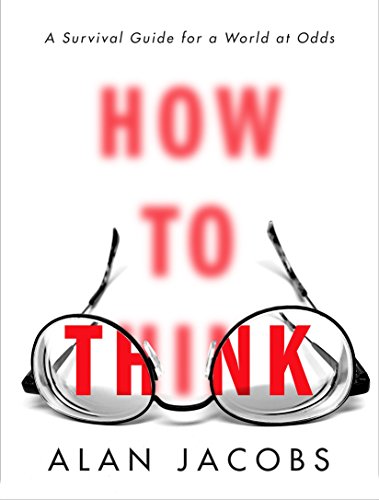How to Think: A Survival Guide for a World at Odds is a brilliant little book that I think everyone should read. This isn’t a book about getting smarter, but rather a book about becoming wiser and more caring.
This timely book addresses the growing political, social, and religious divides in our culture as problems that could be bridged if we would take time to think. To that end, he offers a number of strategies that can retrain and reshape our thinking so that we can better understand and communicate civilly with those who seem to be “repugnant cultural others” or RCOs—an appellation coined by Susan Harding in 1991.
Author Alan Jacobs is concerned that “we suffer from a settled determination to avoid thinking” (p. 17). The work required to think might shake up settled habits, friendships, thought patterns, and other aspects of our lives, so, as he demonstrates, most of us tend to shape our thinking to conform to the communities in which we spend the most time. Jacobs points out the pitfalls that result from our limited, sheltered thinking.
Rather than a book that laments the present state of our culture, this is a book of positive strategies. Jacobs points out the sources of problematic thought patterns, but then he helps us understand how our minds operate so that we can better control our thoughts and judgments.
For example, he has a section titled “Why Thinking for Yourself is Impossible” where he points out that it is impossible for us to think independent of any other human thought: “Everything you think is a response to what someone else has thought and said” (p. 37). However, he points out that we are generally so heavily influenced by our own like-minded circles that we do not have any understanding of the RCOs. We have no idea why they believe what they believe. His recommendation to remedy the problem: “Seek out the best and fairest-minded of people whose views you disagree with. Listen to them for a time without responding. Whatever they say, think it over” (p. 155). This is only one of a number of useful relational strategies that require us to think more deeply.
While this was written as a secular book, Jacobs’ Christian beliefs and attitudes seem to underlie much of what he says. He seems to have a deep concern that we learn to love our neighbor as Jesus commanded. In one section he talks about being open to real conversations with RCOs. He points out that when we do that we no longer view the person as “the other” and begin to see him or her as “my neighbor.” It then becomes much more difficult to treat that person as “so obviously wrong that no debate is required, only mockery” (p.83). If we listen to their rationale for their beliefs and try to understand from their point of view, we can begin to relate to them as fellow human beings and maybe even as friends.
Jacobs believes that the problem is at least partly based on our own will, what we choose to do. He says, “You have to be a certain kind of person to make this book work for you: the kind of person who, at least some of the time, cares more about working toward the truth than about one’s current social position” (p.150, italics in the original).
How to Think is full of wisdom, but it is an easy book to read. You might read it in just a couple sittings, but you might find yourself pondering how to put it into action for the rest of your life.










